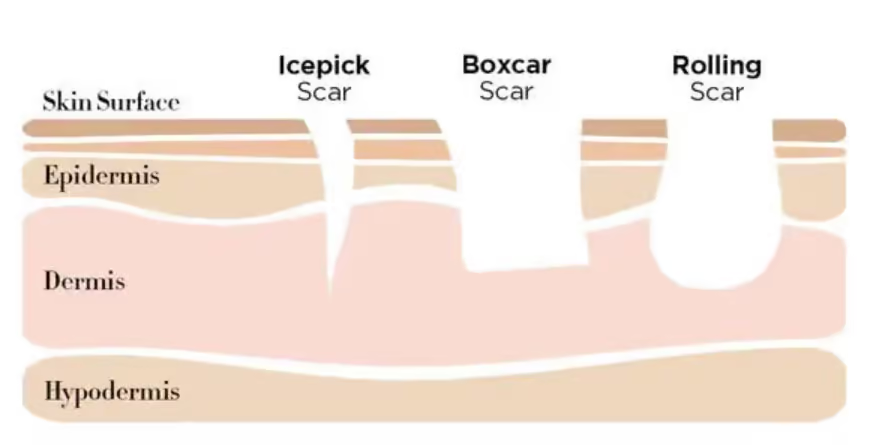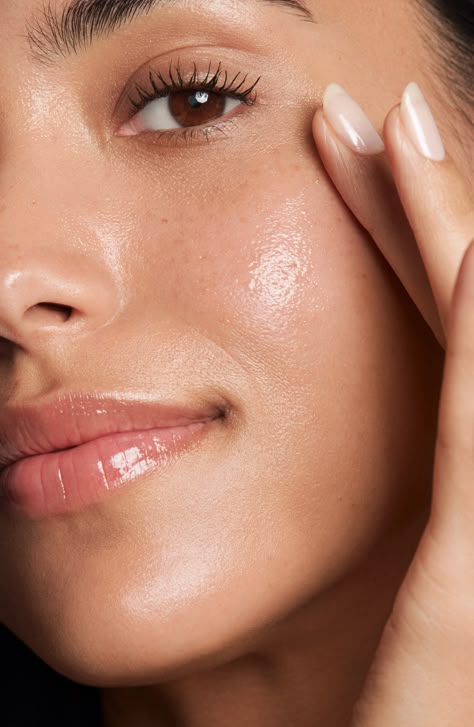Acne and Scars
Acne can leave a scar on your skin as a permanent reminder of its presence. While these warning signs of bumps and depression have no serious
health consequences, they can harm your self-esteem, which is never a good thing.
Fortunately, there are acne scars treatment in Dubai to make them less visible, which means you don’t have to struggle with acne’s scarred pits and undulations! At Amwaj Polyclinic, our experts creates customized acne scars treatment plans for each client, supported by her years of experience and medical expertise.
What is Acne?
Acne is a disfiguring and often painful skin condition that occurs when our hair follicles become clogged with bacteria, dead skin cells, and sebum. Pus-filled pimples, whiteheads, and blackheads are typical symptoms of this chronic skin condition. Acne is more prevalent among teenagers but can affect people of all ages.
Acne most commonly appears on the face and neck but can also appear on the shoulders, arms, and back.
What are Acne Scars?
Acne spots are a change in skin color that eventually leads to acne scars, which are a change in skin texture. Not to mention, acne scars though not fatal, can cause emotional distress, depending on their severity.
Types of Acne Scars

Causes of Acne and Acne scars
The following are the primary causes of acne:
- Excessive oil (sebum) production in the skin
- Oil and dead skin cells clog the hair follicles
- Bacteria
- Inflammation
Most acne scars result from an inflamed lesion, such as a papule, pustule, or cyst. Blemishes become inflamed when the follicle, or pore, becomes clogged with excess oil, dead skin cells, and bacteria. The pore swells and tears the follicle wall.
The lesion is usually minor and heals quickly if the rupture occurs near the skin’s surface. More serious lesions develop when there is a deep break in the follicle wall. The infected material spreads into the dermis and destroys healthy skin tissue.
The skin forms new collagen fibers to repair the dermal damage. Collagen is a fibrous protein that provides strength and flexibility to the skin. Unfortunately, the completed “repair job” is never as smooth and flawless as before the injury.
Acne Scars Treatment in Dubai
The acne scars treatment in Dubai listed below has been tried and tested.
Look for the best ones, assess your level of comfort, consult with our skin doctors at Amwaj Polyclinic, and then proceed:
FSR (Fractional Skin Resurfacing): This ultimate skin-restoring tool uses fractional ablation with deep volumetric heating technology. It helps reduce pores, wrinkles, scars, and hyperpigmentation while improving the overall skin texture on both the face and the body.
Chemical Peel: For many years, peels have been used for acne scars treatment in Dubai. Dermatologists use the best exfoliation possible depending on the skin type and severity of acne and scarring. Chemical peeling can reduce scarring by 70% in most cases.
Also Read : YELLOW PEEL TREATMENT: A REJUVENATING SKIN TREATMENT FOR ACNE CONTROL AND BLEMISHES REDUCTION
RF Microneedling (Radio-Frequency Microneedling): Many patients struggle with scars caused by skin trauma or post-surgery scarring. Women, in particular, often complain about stretch marks, which occur when the skin expands rapidly.
To address these issues, we use RF Microneedling with an ENDYMED machine. Its fractional technologies improve the appearance and reduce scars and stretch marks non-invasively. It utilizes non-insulated gold-plated RF microneedles with smooth motion insertion, providing patients optimal comfort and results. This treatment for acne scars treatment in Dubai is considered more effective
than conventional micro needling in Dubai methods. It has minimal downtime and no risk making it an attractive option for those looking to improve the appearance of scars or stretch marks.
Microdermabrasion: This high-tech procedure for acne treatment in Dubai uses a special machine to remove the topmost layer of skin to stimulate the growth of new skin, resulting in less scarring. However, the treatment can only be used on inactive acne, or else the infection may spread to nearby skin areas.
Laser Therapy: Probably the most well-known and simple to prepare for. Laser therapy employs soft laser beams to combat acne scars without harming the surrounding tissue. It is important to note that this therapy is slower than laser resurfacing and requires multiple sessions.
Dermal Fillers: Dermal Fillers in Dubai are an instant solution to eliminate acne or stubborn scars. When hyaluronic acid-containing dermal fillers are injected directly into the skin, scars fade immediately. Keep in mind that this is only a temporary solution that may benefit you more over time.
Topical Solutions for Acne Scars Treatment in Dubai
Besides the above methods, acne can also be treated with some topical medications.
Topical medications are typically gels, creams, and lotions that aid in the removal of excess sebum and impurities from follicles and pores.
Some of the acne-prevention topicals include:
- Oral Antibiotic
- Oral Hormonal
- Oral Isotretinoin
- Topical Retinoids
- Topical BPO
- Topical Antibiotics or Topical Dapsone
Our qualified and experienced team at Amwaj Polyclinic offers a wide range of non-surgical acne scars treatment in Dubai. These are effective alternatives to surgery to help you maintain a healthy and youthful appearance.
We provide everything your skin requires and deserves, such as facials, laser treatment in Dubai, and other treatments, in a state-of-the-art facility with cutting-edge technology. We perform a thorough diagnosis of your skin problem in order to provide you with personalized treatment plans.
Schedule your consultation today for acne scars treatment in Dubai. Enjoy and feel good in your own skin!
FAQs for Acne Scars Treatment in Dubai
The level of pain varies depending on the chosen treatment. Some procedures, such as laser therapy or microneedling, may cause mild discomfort, but topical anesthesia or numbing creams are often applied to minimize any pain.
Downtime also varies depending on the treatment. Some procedures may have minimal downtime, while others may require a few days for recovery. It’s essential to follow post-treatment care instructions provided by the dermatologist or skincare professional.
The longevity of results depends on the type of treatment and individual skin characteristics. While some treatments offer long-lasting results, maintenance sessions may be required for sustained improvement.
Most acne scars treatments are safe for a range of skin types. However, it’s crucial to consult with a qualified dermatologist or skincare professional who can assess your skin and recommend the most suitable treatment based on your skin type and condition.
Yes, in many cases, dermatologists recommend combining acne scars treatments with a tailored skincare routine. This may include specific cleansers, moisturizers, and sunscreen to enhance the overall results and promote skin health.


